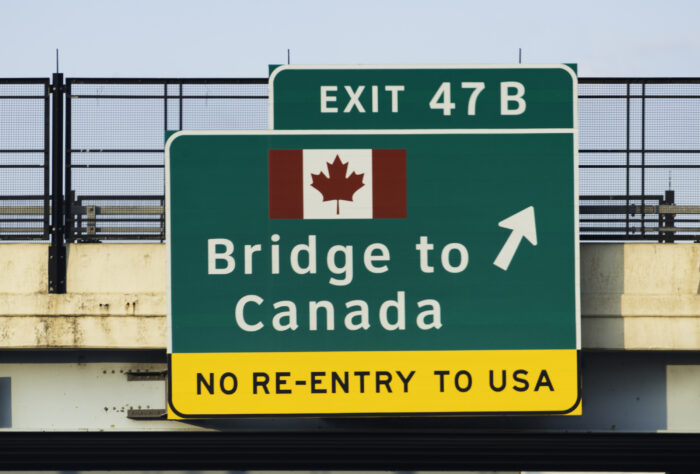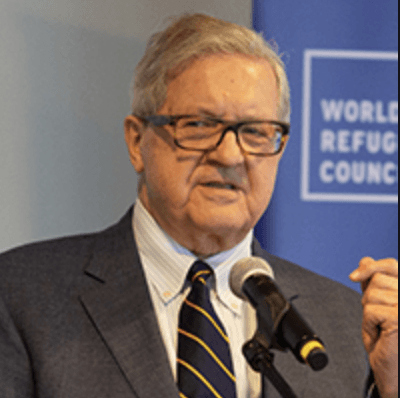Opinion by Lloyd Axworthy and Allan Rock
This op-ed was first published in The Globe and Mail
For four weeks in April and May, 2017, then 20-year old Nedira Mustefa was detained in Clinton County Jail in upstate New York. Her first week was spent in solitary confinement. She was then held within the general prison population. Ms. Mustefa– a Muslim – lost almost 15 pounds over those four weeks because the food she was served contained pork. She was constantly freezing cold: She wore socks on her hands and huddled under a towel to keep warm during the day. She did not know when, or if, she would be released.
Originally from Ethiopia, Ms. Mustefa had never before been arrested or detained. Nor was she facing any charges. So what was her “crime”? Ms. Mustefa was jailed by American authorities for attempting to seek refugee protection in Canada. She had been turned back at our border because she was deemed ineligible for refugee status under the U.S.-Canada Safe Third Country Agreement (STCA).
In force since 2004, the STCA is a pact whereby both countries regard each other as, in effect, safe havens. Accordingly, each country bars asylum seekers arriving from the other at official points of entry, reasoning that either provides adequate protection from return to persecution.
But the premise of the STCA – that both countries are safe for asylum seekers – has not held true for some time. Ms. Mustefa is just one of the many refugee claimants who have been jailed in the United States after coming to our border to seek protection and then being turned away.
Late last month, the Federal Court of Canada declared the STCA to be unconstitutional. The decision confirms what has long been well known: America is no longer “safe” for asylum seekers. The Court held that the treatment of STCA returnees violates the provisions in the Canadian Charter of Rights and Freedoms that guarantee the liberty and security of the person.
“The sad fact is that the United States is no longer a trustworthy partner in refugee protection.”
Lloyd Axworthy & Allan Rock
The evidence in support of the Court’s finding is stark and compelling. In addition to solitary confinement, STCA returnees report extended detention without a hearing, verbal abuse, lack of adequate medical care, and physical and psychological suffering.
The Court decided that although the violations were inflicted by Americans, Canadian officials are not immunized from responsibility: When they turned back the asylum seekers, they were well aware of the fate that would befall the returnees. The Court rejected the notion that these violations could be justified: “Responsibility sharing,” noted Federal Court Justice Ann Marie McDonald in her judgment, “cannot be positively balanced against imprisonment or the deleterious effects of cruel and unusual detention conditions, solitary confinement, and the risk of refoulement. In my view, to find otherwise would be entirely outside the norms accepted in our free and democratic society”
The message could not be clearer: Canada is complicit in the mistreatment of refugees when it closes its door to them and sends them back to America.
So where do we go from here? Thankfully, the answer is quite simple.
First, Canada must immediately stop returning asylum seekers to the U.S. under the STCA. Although the Court suspended the effect of its decision for six months to allow Parliament to respond, it would be unconscionable for Canadian officials to continue sending claimants back in the meantime, to be imprisoned and abused. Given the fundamental rights and interests at stake, surely even one more is one too many.
Second, Canada should do the right thing and accept the Court’s judgment without appeal. It is now incontrovertible that the STCA causes tangible harm to people turned back at the border. Furthermore, the STCA encourages irregular border crossings, which undermine Canadians’ trust and confidence in our immigration and refugee system. When irregular crossings take place through fields or rivers, they are also dangerous for those seeking protection. Now that the STCA has been struck down, irregular crossings will hopefully end, making for a more orderly and humane processing of people who seek Canada’s protection at the border.
It is important to note that even after the STCA, asylum seekers such as Ms. Mustefa will still have to establish before a Canadian tribunal that they qualify for refugee status under international law. But they will no longer be automatically deemed ineligible for that status merely because they crossed into Canada from the United States.
The sad fact is that the United States is no longer a trustworthy partner in refugee protection. It is high time that the policies at our border reflect that fact, and the respect for human rights and justice that Canadians hold dear.


